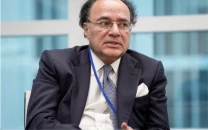Pakistan's startups raise over $1b in a decade
i2i says 386 deals signed since 2015; experts urge sustained support

Pakistan's startups have attracted over $1 billion in funding through 386 deals signed by their owners and founders with investors, venture capitalists, and various institutions in a decade, a think tank reported.
According to Invest2Innovate(i2i), Pakistani startups received an estimated investment of $1.037 billion since 2015 in 368 disclosed deals. The actual investment value may be higher due to undisclosed deals during the cited period. Handsome funding through different rounds was received by the startups from local and foreign investors. Moreover, various policy measures from regulators and the government also helped build a healthy ecosystem for startups.
Muhammad Yasir, an eminent senior analyst on business and technology, said the unstable political and microeconomic situation caused hardships to the startup ecosystem. A few startups were shut down as a result, while several are struggling to attain profitability.
During the last decade, high inflationary pressure affected consumer demand, which also hurt the business of startups and discouraged investors from entering the Pakistani market.
On the contrary, a number of startups in Pakistan attracted investors' attention and grew their business on a sustainable basis. These include Bykea, Bookme, Krave Mart, PostEx, ABHI, and others. There are also exceptional success stories. ABHI, one of the leading fintech startups, expanded into various countries and acquired a major shareholding in a foreign microfinance bank operating in Pakistan.
Yasir urged the government, venture capitalists, and the private sector to continue allocating funds, investments, and equity options for future potential startups. According to StartupBlinka global startup ecosystem map and research centreover 525 top startups in Pakistan were registered by April 2025. Various incubation and innovation centres operating in Pakistan aim to mentor and provide resourceful training to startups. Despite challenges, there is cautious optimism for a recovery in late 2025, driven by improving economic fundamentals, interest rate reductions, and growing regional investor interest in Pakistan's startup ecosystem, the report by i2i stated. The think tank forecast that the road ahead remains challenging for Pakistani startups, but resilience and adaptability continue to define the ecosystem. To foster a more favourable funding environment, key areas of focus should include regulatory reforms, incentives for domestic capital deployment, and strategic partnerships.
Saad Shah, CEO of Hexalyze Consulting Services, said tech and financial entities could contribute to the startup ecosystem not only through investments but also by forming strategic partnerships, including mentoring and offering subsidised services.
He said globally, universities and incubation centres are often funded and supported by tech and financial companies to help startup ecosystems flourish. For instance, Pakistan's Hexalyze Consulting Services became a partner of Singapore Management University to provide subsidised services to startups in Singapore.
Project Director at NIC Karachi, Syed Azfar Hussain, said a key driver of this growth over the past decade is the rise of National Incubation Centres (NICs). These centres have supported over 1,500 startups across eight cities, helping them raise Rs31 billion in investment and generate Rs23 billion in revenue. By offering structured programmes, mentorship, investor access, and links to government and corporate stakeholders, NICs have enabled startups to validate ideas, scale, and become investment-ready. Hussain said the future of Pakistan's startups lies in building globally competitive products with strong regional relevance. As part of the MENAP region, Pakistan shares similarities with the Middle East, especially Saudi Arabia and the UAE. Startups like Disrupt Labs, Autilent, Creative 3D, and Fortify have already followed success stories like Careem, Blink, Jalebi, and Retailo into these markets. With programmes like BridgeStart by Ignite National Technology Fund, startups with proven traction now have structured support to scale in Saudi Arabia and the UAE.




















COMMENTS
Comments are moderated and generally will be posted if they are on-topic and not abusive.
For more information, please see our Comments FAQ